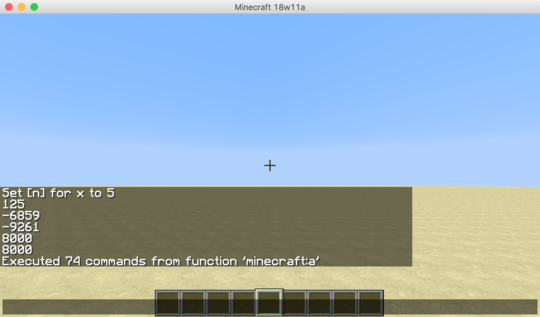x86, 41 39 bytes
Mostly straightforward implementation of the formula with input in ecx and output on the stack.
The interesting thing is that I used a cubing function, but since call label is 5 bytes, I store the label's address and use the 2 byte call reg. Also, since I'm pushing values in my function, I use a jmp instead of ret. It's very possible that being clever with a loop and the stack can avoid calling entirely.
I did not do any fancy tricks with cubing, like using (k+1)^3 = k^3 + 3k^2 + 3k + 1.
Changelog:
.section .text
.globl main
main:
mov $10, %ecx # n = 10
start:
lea (cube),%edi # save function pointer
call *%edi # output n^3
sub %ecx, %eax # n^3 - n
# edx = 0 from cube
push $6
pop %ebx # const 6
idiv %ebx # k = (n^3 - n)/6
mov %eax, %ecx # save k
call *%edi # output k^3
push %eax # output k^3
not %ecx # -k-1
call *%edi # output (-k-1)^3
inc %ecx
inc %ecx # -k+1
call *%edi # output (-k+1)^3
ret
cube: # eax = ecx^3
pop %esi
mov %ecx, %eax
imul %ecx
imul %ecx
push %eax # output cube
jmp *%esi # ret
Objdump:
00000005 <start>:
5: 8d 3d 22 00 00 00 lea 0x22,%edi
b: ff d7 call *%edi
d: 29 c8 sub %ecx,%eax
f: 6a 06 push $0x6
11: 5b pop %ebx
12: f7 fb idiv %ebx
14: 89 c1 mov %eax,%ecx
16: ff d7 call *%edi
18: 50 push %eax
19: f7 d1 not %ecx
1b: ff d7 call *%edi
1d: 41 inc %ecx
1e: 41 inc %ecx
1f: ff d7 call *%edi
21: c3 ret
00000022 <cube>:
22: 5e pop %esi
23: 89 c8 mov %ecx,%eax
25: f7 e9 imul %ecx
27: f7 e9 imul %ecx
29: 50 push %eax
2a: ff e6 jmp *%esi
Here is my testing version that does all the cubing at the end. After the values are pushed on the stack, the cube loop overwrites stack values. It's currently 42 40 bytes but there should be some improvements somewhere.
.section .text
.globl main
main:
mov $10, %ecx # n = 10
start:
push %ecx # output n
mov %ecx, %eax
imul %ecx
imul %ecx
sub %ecx, %eax # n^3 - n
# edx = 0 from imul
push $6
pop %ecx # const 6
idiv %ecx # k = (n^3 - n)/6
push %eax # output k
push %eax # output k
not %eax # -k-1
push %eax # output -k-1
inc %eax
inc %eax # -k+1
push %eax # output -k+1
dec %ecx # count = 5
add $20, %esp
cube:
mov -4(%esp),%ebx # load num from stack
mov %ebx, %eax
imul %ebx
imul %ebx # cube
push %eax # output cube
loop cube # --count; while (count)
ret

Two questions: Can we output any result, or only the smallest? For
-10another possible solution could be-1000+4574296+4410944-4492125-4492125for example. And is it allowed to output--or+-instead of+/-respectively (i.e.3 = 27+-27+-125--64--64instead of3 = 27-27-135+64+64)? – Kevin Cruijssen – 2018-04-04T07:17:01.730@KevinCruijssen Any result is fine. If you mean output like
– xnor – 2018-04-04T07:18:28.833--5, I'd say no, as per usual rules on outputting an expression.@KevinCruijssen You don't have to output an expression with
+signs, just the numbers. – xnor – 2018-04-04T07:20:29.017-10 = -64 - 64 + 64 + 27 + 27or-10 = -343 + 0 -8 +125 +216– Angs – 2018-04-04T07:31:49.413I'm assuming repetition is allowed? – VortexYT – 2018-04-04T08:27:03.257
@VortexYT Yes, repetition is allowed. – xnor – 2018-04-04T08:36:24.497
Just to check: must we output one solution, or can we output several of them? – Luis Mendo – 2018-04-04T14:45:02.807
@LuisMendo Just output one. – xnor – 2018-04-04T21:36:16.527
3Interesting note: 3 is not sufficient (some numbers are unrepresentable), but there are some numbers whose representability is unknown (such as 33). – Esolanging Fruit – 2018-04-05T02:11:35.967